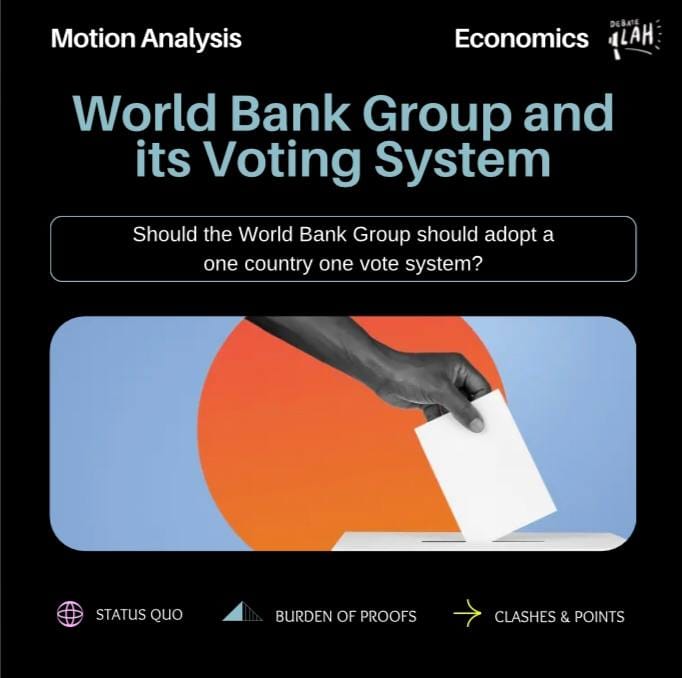The World Bank
In recent years, international institutions like the World Trade Organisation and International Monetary Fund have been scrutinised over various issues like their questionable effectiveness in preventing global economic depressions and dubious biassed practices in implementing fiscal policies in underdeveloped nations. The most prominent of these institutions, the World Bank, has come under scrutiny for the lack of third world representation and political repression of its recipient nations.
The World Bank was originally established to help underdeveloped nations alleviate poverty and develop the third world by giving out low interest loans. However, given the political repression of the same nations they vowed to help, many suggestions have been raised to restructure the World Bank by creating a one country one vote system. Will this new system help developing nations fight back and gain a seat at the bargaining table? Or will this just further entrench these countries in a cycle of poverty? With these questions unanswered, let us give you our analysis and argumentation on the motion:
THBT the World Bank Group should adopt a one country one vote system
This motion encourages debaters to evaluate the economic and political implications of restructuring the World Bank. Let us know if you’d like to see a one country one vote system implemented!
Status Quo: Underrepresentation and Repression of Developing Nations
The World Bank in status quo operates off a voting system that ensures the amount a nation donates to the bank is directly proportional to the amount of voting power they get. For example, the USA will have the voting power to veto certain policies whilst a nation like Senegal wouldn’t. This creates a scenario where smaller nations are unable to get equal weightage at the bargaining table of the World Bank. Consequently, this creates an environment where smaller nations are forced to appease the political demands of the major superpowers that fund the World Bank. Sometimes, World Bank policies formulated by these superpowers also disrupt local businesses that are unprepared to adapt to opening up to the global market.
By implementing a one country one vote system, smaller nations are able to collectivise and demand for more localised and nuanced policy alternatives. Smaller countries are also able to resist coercion from bigger nations as they are able to vote out policies that actively harm their interests.
However, by implementing such a system, it might incentivize the major financiers of the World Bank to actively cut down on funding as they no longer see any benefit as to providing any additional funding to the World Bank. As a result, the probability of these smaller nations opting into worse alternatives such as the Asian Infrastructure Investment Bank that have higher interest rates.
Proponents of political restructuring would argue that the World Bank imposes unrealistic conditions for loans on poverty stricken countries and diverts resources from the nations that need them the most. Aid becomes weaponized for superpower nations to consolidate power.
Opponents of political restructuring would argue to defend the status quo. They would characterise the status quo as being an eventual shift towards a more accountable and transparent World Bank.
Mechanisms
Proponents state that nations would have to contribute to the World Bank based on the size of their economy via annual fees. The World Bank is also still able to accrue funding via alternatives like non-state actors like the Melinda Gates Foundation. Even if these sources aren’t adequate enough, on scale, the World Bank is still able to accrue large amounts of funding as the gross domestic products (GDP) of superpowers like the USA is worth billions.
Opponents state that instead of changing the voting system, they would vouch for more representation in the form of electing third world leaders into the Board of Executive Directors.
#1 Who is able to create a more accountable World Bank?
Proponents argue that weighted voting systems undermine the Bank’s goals to reduce global poverty. This is because such a system enables the wealthiest countries to overturn policies that actively work against their favour, creating an oppressive chokehold on the bank. As a result, things like unrealistic loan conditions and economic policies are more likely to be formulated by the World Bank. The incentive for developing nations now shifts towards increasing their GDP and net exports rates rather than to eradicate poverty on a domestic scale in order to secure higher credit scores to appease the bank. This forceful imposition of 1st world economics causes the already massive wealth gap in developing countries to grow further apart. Additionally, when the World Bank pushes such destructive policies, it slowly drives away poorer nations to worse alternatives like the Asian Infrastructure Investment Bank (AIIB) led by China that leverages their credit scores. For example, Hambantota Port that was seized by the Chinese authorities once Sri Lanka defaulted on their debt to them. Comparatively on proposition side, an equal voting system would enable developing countries to stand up against these superpowers and push for more localised and nuanced policies based on their unique expertise. For example, the microcredit systems by Bangladesh’s Dhrami Bank that lifted millions out of poverty.
Opponents would say that such accountability can be achieved without such a drastic change to the World Bank. Opposition could point to the status quo of African nations collectivising in the World Bank to achieve regional change. Opponents also argue that such a shift in the World Bank would only make superpowers find new ways to exploit the Bank. This can range from extortion all the way to threatening to cut off other forms of aid for these smaller nations. Consequently, this reverses the progress made by the Bank in order to promote better transparency and accountability. This also looks like the collapse of legal and journalistic accountability as these extortions will occur outside of the World Bank’s jurisdiction. The culmination of these harms would cause the already overwhelmingly negative narratives of the World Bank to be reinforced even further, causing public distrust and further delineation from the bank. Hence, opposition could also argue about the harms of the AIIB and China.
#2 Which side is able to alleviate developing nations from poverty?
Proponents propose that once developing nations are able to take back the bank, nations will be more incentivised to actively participate in the bank’s development policies. There’s an additional layer of assurance for these nations as they now possess the ability to outvote their already fragile economies. Ultimately, this also incentives larger financial superpowers from stepping out of their boundaries to stay in the World Bank in order to maintain their legitimacy. Proponents would also argue that in opposition’s world, the World Bank would entrench these nations further into the cycle of poverty. Proposition would argue that superpowers have a tendency to favour their proximate allies to reinforce relations between them. For example, when the US distributed aid for earthquakes in Haiti but refused to do so for Turkey and Syria. Additionally, developing nations also lose the ability to protect their local industries when faced with a politically biassed World Bank. For example, this would look like the US forcing nations like Pakistan and India to cut subsidies in its steel industry so that the steel industries back at home are able to remain competitive globally.
Opponents would state that if the World Bank still gets funding, there will be a massive perception change as the United States no longer guarantees the World Bank its current contributions. Since the leadership of the US in the World Bank guarantees access to lower rates of loans as they lend their credit rating, wealth, and reputation through the World Bank, changes in the voting system will disrupt the whole working structure. The collective wealth of the US and other superpowers is represented by the World Bank thus allowing private financiers at ease which allows delving countries to borrow at much lower rates. The access to these low-rate loans is crucial because if they were to opt out of the World Bank, they would only receive worse rates for loans thus cutting back on social programs. On top of that, confidence in the bank will slowly collapse as superpowers no longer cover it. This will downgrade the credit ratings thus bringing up the costs of borrowing. Especially in times of economic uncertainty, lenders will pursue harsh conditions of restructuring as they want to restore as much as possible. This is due to the absence of guarantees that the US will cover when a nation defaults. The biggest drawback of this might be the rollback of democracy. In this scenario, more countries will pursue less accountable loans while having more corruption which entrenches power in the political elites.
Burden of Proofs
Now that you’ve understood the political restructuring of the World Bank, do you think each side proved their burden?
Proponents should prove why a politically clean World Bank is the only path to fulfilling the agenda of equitable world development even if it comes at the cost of less funding.
Opponents should prove why their solution is the superior alternative to proponents.
Do you think the World Bank can improve its efficiency by having a one-country-one-vote system? Or will this solution counter the purpose of the World Bank?
That was an interesting read!
Here's a document that provides a deep analysis of all you need to know about understanding both ends of the topic at hand.
You may use this for mock debates, or just to gain an understanding of the World Bank and the influence of global politics impacting its policies on developing nations!
Whether political restructuring is necessary for the World Bank is something hard to understand and tackle, so we’ve linked some relevant resources below to get you started!
- Accountability for the World Bank

Lastly, cheers to Team Malaysia and Team New Zealand of WSDC 2023 for the insightful debate!
Authors: Adam Syahmi, Jacquelyn Hon, Chloe Koh


